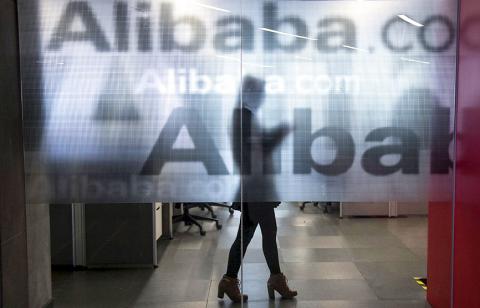Alibaba Group Holding Ltd (阿里巴巴) bought 33 million shares of Groupon Inc, making it the fourth-largest shareholder in the online deals Web site that has lost 86 percent of its value since going public more than four years ago.
The Chinese e-commerce giant owned 5.6 percent of Chicago-based Groupon as of Dec. 31, according to a regulatory filing on Friday.
Alibaba has also accumulated stakes in online retailer Jet.com Inc, augmented-reality provider Magic Leap Inc and car-booking company Lyft Inc.

Photo: Reuters
A spokesman for Hangzhou, China-based Alibaba declined to immediately comment on the filing.
Groupon spokesman Bill Roberts said the company had not been aware of Alibaba’s stake until Friday’s filing.
“Alibaba has a reputation as a long-term holder, and we’re pleased that they take the same view of Groupon’s opportunity and execution as we do,” Roberts said.
Alibaba’s stake was reported hours after Groupon had its best day with investors in more than four years. Groupon shares surged 29 percent to US$2.89 on Friday in New York, the biggest single-day increase since Nov. 4, 2011 — the day after its initial public offering at US$20 a share.
Groupon on Thursday reported fourth-quarter results that beat analysts’ estimates, driven by purchases in North America.
The company said profit excluding some costs was US$0.04 a share, compared with the average analyst estimate for a break- even quarter.
“If we do our jobs really well, we’ll beat our plan,” Groupon CEO Rich Williams said in an interview. “The reality is we have a lot of work to do.”
Even with Friday’s gains, the shares are down 61 percent over the past 12 months.
On Bloomberg Television Friday, Williams said his company’s stock was undervalued, but that it was not looking to make any deals.
“Our focus as a team just isn’t on things like acquisitions, or being acquired,” Williams said. “Our focus is on building a great business.”
Groupon said adjusted earnings before interest, taxes, depreciation and amortization would be US$80 million to US$130 million this year, compared with analysts’ projection for US$105.1 million.
Revenue in the period rose 3.8 percent to US$917.2 million, beating estimates for US$845.9 million.
Groupon is continuing its search for a permanent chief financial officer and is interviewing internal and external candidates, Williams said.
“One of the things you saw in the fourth quarter was faster-than-expected progress on the restructuring side,” Williams said on the conference call.
Groupon has exited 17 countries and now operates in 28 as it continues to streamline its operations internationally.
“We are feeling pretty good about our footprint,” Williams said. “But we are going to continue to evaluate it opportunistically.”

When Lika Megreladze was a child, life in her native western Georgian region of Guria revolved around tea. Her mother worked for decades as a scientist at the Soviet Union’s Institute of Tea and Subtropical Crops in the village of Anaseuli, Georgia, perfecting cultivation methods for a Georgian tea industry that supplied the bulk of the vast communist state’s brews. “When I was a child, this was only my mum’s workplace. Only later I realized that it was something big,” she said. Now, the institute lies abandoned. Yellowed papers are strewn around its decaying corridors, and a statue of Soviet founder Vladimir Lenin

UNIFYING OPPOSITION: Numerous companies have registered complaints over the potential levies, bringing together rival automakers in voicing their reservations US President Donald Trump is readying plans for industry-specific tariffs to kick in alongside his country-by-country duties in two weeks, ramping up his push to reshape the US’ standing in the global trading system by penalizing purchases from abroad. Administration officials could release details of Trump’s planned 50 percent duty on copper in the days before they are set to take effect on Friday next week, a person familiar with the matter said. That is the same date Trump’s “reciprocal” levies on products from more than 100 nations are slated to begin. Trump on Tuesday said that he is likely to impose tariffs

HELPING HAND: Approving the sale of H20s could give China the edge it needs to capture market share and become the global standard, a US representative said The US President Donald Trump administration’s decision allowing Nvidia Corp to resume shipments of its H20 artificial intelligence (AI) chips to China risks bolstering Beijing’s military capabilities and expanding its capacity to compete with the US, the head of the US House Select Committee on Strategic Competition Between the United States and the Chinese Communist Party said. “The H20, which is a cost-effective and powerful AI inference chip, far surpasses China’s indigenous capability and would therefore provide a substantial increase to China’s AI development,” committee chairman John Moolenaar, a Michigan Republican, said on Friday in a letter to US Secretary of

Taiwan Semiconductor Manufacturing Co’s (TSMC, 台積電) market value closed above US$1 trillion for the first time in Taipei last week, with a raised sales forecast driven by robust artificial intelligence (AI) demand. TSMC saw its Taiwanese shares climb to a record high on Friday, a near 50 percent rise from an April low. That has made it the first Asian stock worth more than US$1 trillion, since PetroChina Co (中國石油天然氣) briefly reached the milestone in 2007. As investors turned calm after their aggressive buying on Friday, amid optimism over the chipmaker’s business outlook, TSMC lost 0.43 percent to close at NT$1,150